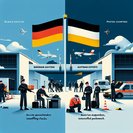
Also on 5 November 2025 the Austrian International Road Transport Association (AISÖ) published the text of a new Interior-Ministry decree that prolongs temporary controls at the Slovak and Czech land borders through 15 October 2025. Although the previous authorisation was not due to expire until next spring, the government says the earlier renewal provides legal certainty for police deployments and for logistics operators planning summer schedules.
The measure means that all travellers—including EU citizens—must continue to cross at designated checkpoints where identity and vehicle documents may be inspected. Freight forwarders report waiting times of up to 45 minutes at the busy Kittsee-Jarovce crossing, but the Interior Ministry argues that the controls have cut people-smuggling cases “close to zero”. Soldiers from the Austrian Armed Forces will keep supporting the police in lane management and mobile patrols.
![Vienna extends border checks with Slovakia and Czech Republic until mid-October 2025]()
For corporate mobility managers the extension translates into possible delays for assignees who commute from Bratislava to Vienna—a popular arrangement given lower housing costs in Slovakia. Employers should remind staff to carry a passport or national ID card and, for third-country nationals, a valid residence permit.
Diplomatically, Vienna has notified the European Commission under Article 25a of the Schengen Borders Code. While Brussels routinely approves such extensions, critics warn that Austria is on its 20th consecutive renewal since 2015 and risks undermining Schengen’s principle of free movement. Nevertheless, with illegal border crossings down by 46 % year-on-year, further roll-backs seem unlikely before the 2026 federal elections.
The measure means that all travellers—including EU citizens—must continue to cross at designated checkpoints where identity and vehicle documents may be inspected. Freight forwarders report waiting times of up to 45 minutes at the busy Kittsee-Jarovce crossing, but the Interior Ministry argues that the controls have cut people-smuggling cases “close to zero”. Soldiers from the Austrian Armed Forces will keep supporting the police in lane management and mobile patrols.

For corporate mobility managers the extension translates into possible delays for assignees who commute from Bratislava to Vienna—a popular arrangement given lower housing costs in Slovakia. Employers should remind staff to carry a passport or national ID card and, for third-country nationals, a valid residence permit.
Diplomatically, Vienna has notified the European Commission under Article 25a of the Schengen Borders Code. While Brussels routinely approves such extensions, critics warn that Austria is on its 20th consecutive renewal since 2015 and risks undermining Schengen’s principle of free movement. Nevertheless, with illegal border crossings down by 46 % year-on-year, further roll-backs seem unlikely before the 2026 federal elections.










